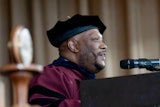System won’t pose expensive administrative burdens for private and small public historically Black schools, HBCU association leaders say.
As Congress moves closer to wrapping up deliberation on the Obama administration’s proposal to convert the U.S. higher education student loan system of public and private lending into one fully run by the federal government, historically Black colleges and universities (HBCUs) aren’t expected to be among the institutions opposing the reform, HBCU leaders say.
The move last month by the U.S. Education Department to advise higher education officials at 3,000 institutions to prepare their schools for full participation in the department’s direct lending program by the 2010-11 academic year ruffled Republican lawmakers and private student loan lending advocates.
Sen. Lamar Alexander, R-Tenn., characterized the department’s Oct. 26 letter recommending schools become “Direct Loanready” by the 2010-11 academic year as “premature.” Sen. Mike Johanns, R-Neb., wrote to Education Secretary Arne Duncan that he was “disappointed in (Duncan’s) actions to encourage this conversion when legislation has not yet become law.”
“Six months is not enough lead time. We are a small office with two professional staff serving 1,200 students,” said Elaine Larson, director of student financial planning at Centre College in Danville, Ky., and a member of ProtectStudentChoice.org – a grassrooots coalition of state and local student loan service professionals.
Yet among the 105 HBCUs, a few dozen of which are private colleges and small public universities, HBCU association and individual school officials report that the majority of their institutions are supportive of the administration’s proposal on direct lending.
Lezli Baskerville, president and CEO of the National Association for Equal Opportunity in Higher Education (NAFEO), says Education Department officials have worked diligently since the spring to assure HBCU presidents and financial aid officials that shifting to a 100-percent direct lending system will not pose onerous and expensive administrative burdens on their schools. NAFEO is a Washington-based advocacy organization that represents the interests of HBCUs and predominantly Black institutions.
U. S. higher education institutions are eligible to participate in direct lending as well as the Federal Family Education Loan (FFEL) program, which subsidizes private banks or other lenders as education loan providers. The U.S. Education Department wants to end the FFEL program and move all student lending to the Direct Loan plan, a move the Obama administration contends will free up billions of dollars annually for annual Pell Grant increases and college-completion grants.
“Many schools, not just historically Black colleges and universities but many other private small colleges, have expressed concerns about doing the switch by next year,” said Edith Bartley, United Negro College Fund (UNCF) director of government affairs. “And, in particular, the challenges that were raised were training for (financial aid) personnel, or the potential need to hire at least one financial aid officer – some of our schools have extremely small financial aid staffs – and the technical assistance needed with the use of technology that’s required to process these loans.”
Over the spring and summer, Education Department officials conducted campus visits along with “webinars and teleconferences with both the presidents and chancellors of our institutions, and their financial aid officers” to educate them about what the proposed federal Direct Loan program, which excludes private lending to students, will mean for their campus financial aid programs, Baskerville said.
“At the end of the (consulting process), an overwhelming number of the (HBCU) members resolved to go forward and support the Direct Loan program,” Baskerville said.
UNCF officials confirmed that Education Department representatives met with its private school members over the past several months. Fifteen out of 39 UNCF schools conduct some form of direct lending to its students.
Bartley says UNCF member school officials have grown comfortable with the Direct Loan plan after meetings with Education Department officials.
The Education Department reports that the conversion to a Direct Loan-only student lending system will be handled through the information technology infrastructure most colleges and universities already use through their participation in the Pell Grant program. Direct Loans and Pell Grants are processed at individual campuses through the Common Origination and Disbursement (COD) system. More than 2,800 institutions participate in the Pell Grant program, and thus their financial aid personnel have experience with the COD system, which would handle the switch to a Direct Loan-only operation, according to Education Department spokeswoman Jane Glickman.
This fall, the Education Department has begun offering webinars consisting of six different 90-minute sessions related to critical aspects of Direct Loan processing.
“From what I understand, the system is pretty user-friendly. Direct Loan processing is an add-on to reporting that (schools) are already doing as they process Pell (Grants)…. The administration has said it’s going to provide the training to help all student aid personnel,” said Dwayne Ashley, president and CEO of the Thurgood Marshall Scholarship Fund (TMCF).
The Education Department reports that more than 500 institutions have joined the Direct Loan program this academic year. Five of those institutions are historically Black colleges. More than 2,000 schools participate in the Direct Loan program.















